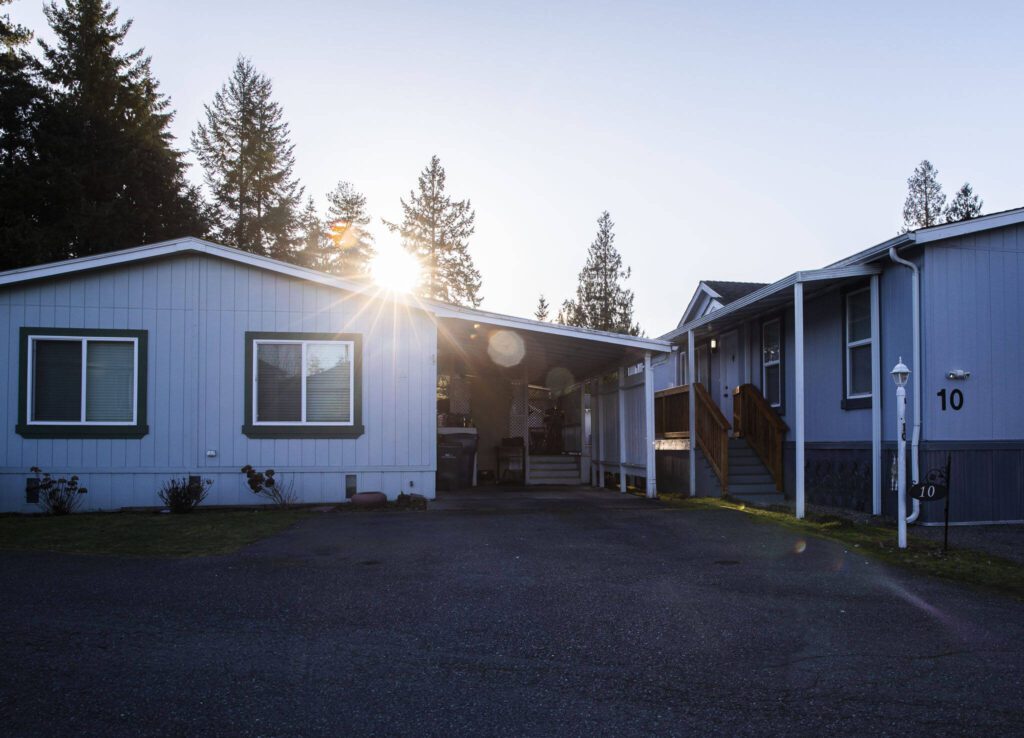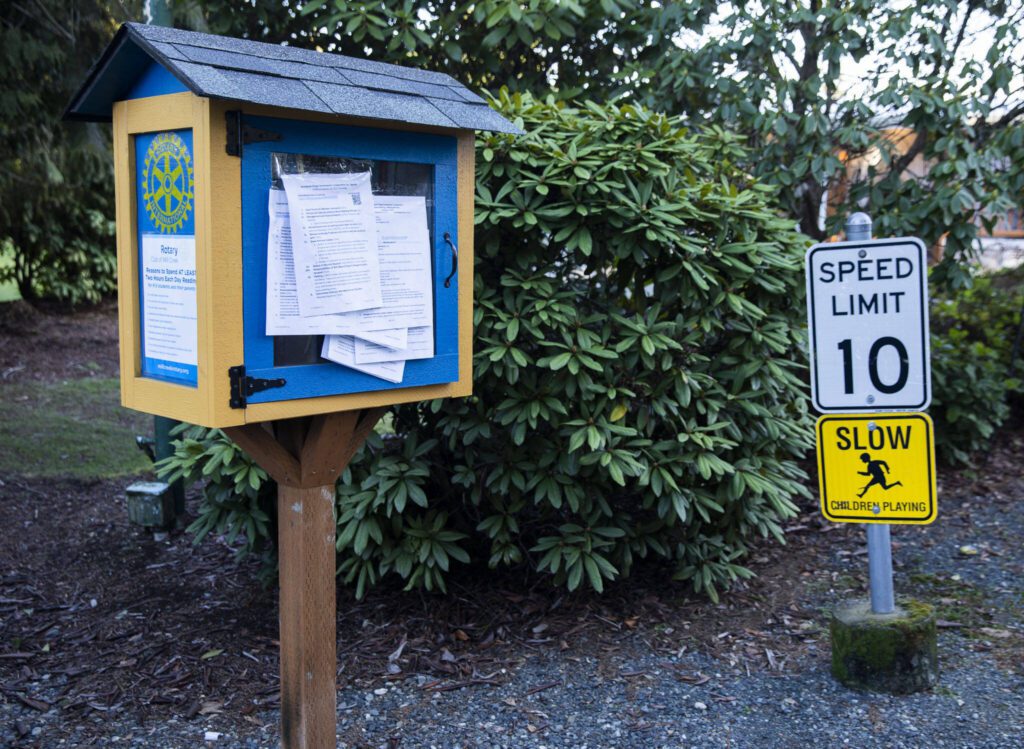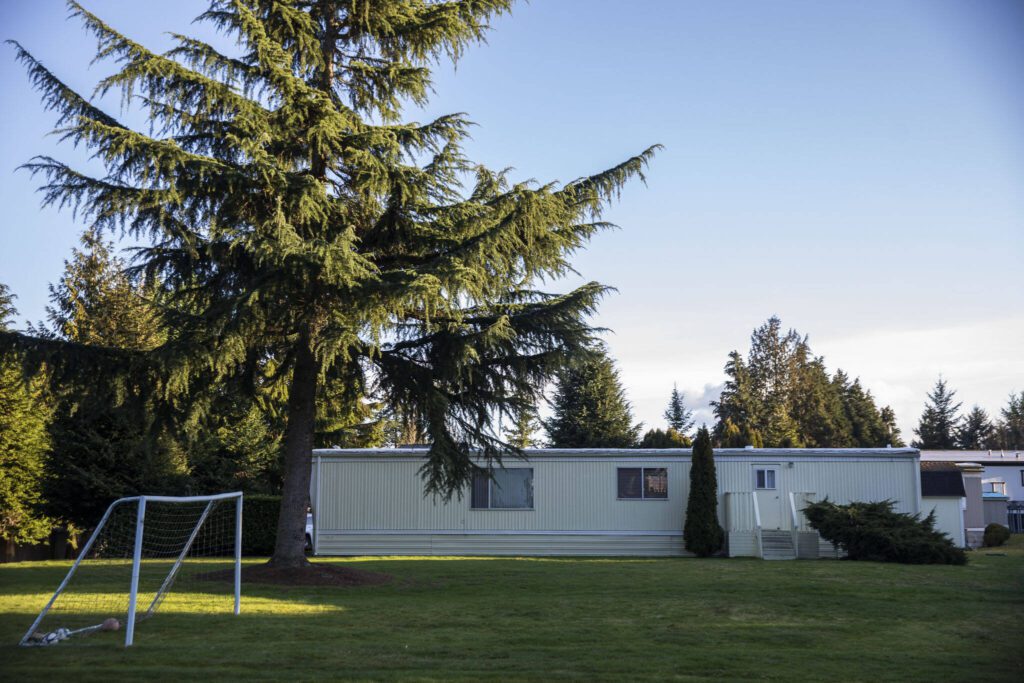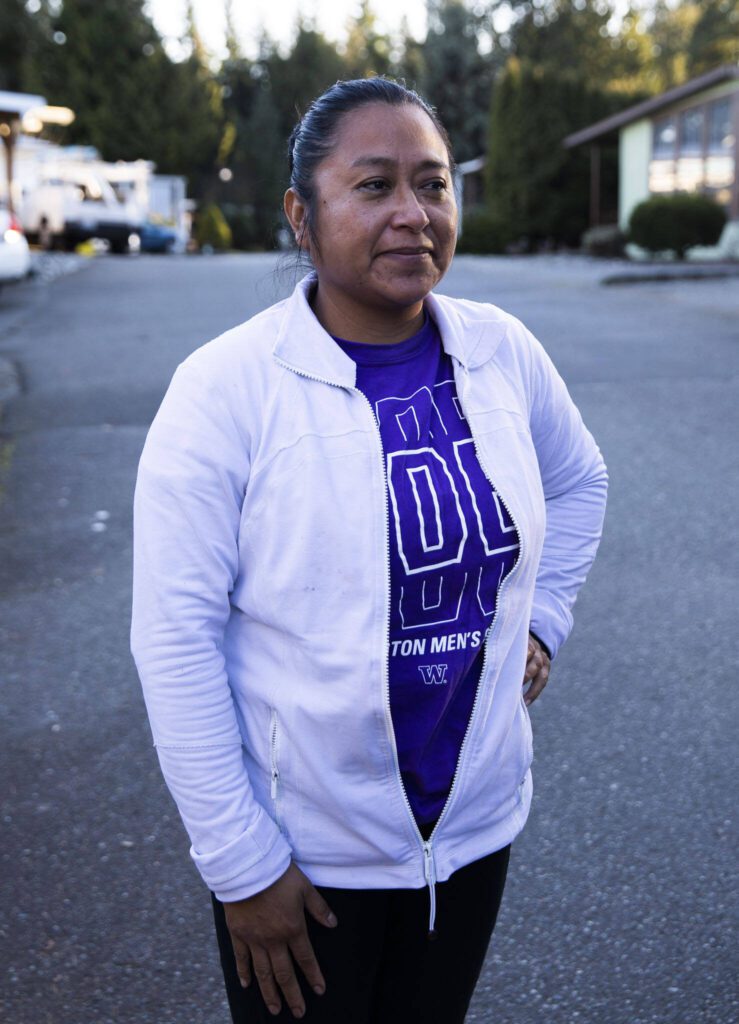MILL CREEK — Ken and Karen Florczak found a notice taped to the front door of their doublewide mobile home early last summer.
The land they lived on was up for sale.
The notice scared the couple. A new investor could raise their rent or force them out to build condos. He researched moving their home from the Sherwood Village community east of Mill Creek. But no neighboring parks had empty lots.
Shortly afterward, the residents received notice from the property’s managers about a meeting with ROC Northwest, the local affiliate of the nonprofit ROC USA. The nonprofit, an association of resident-owned communities, could help turn Sherwood Village’s 35 homes into a cooperative, so they could buy the land themselves.
When Ken Florczak told his neighbors what could happen under new ownership, they agreed the co-op was the better option.
In the fall, over 90% of residents voted in favor to purchase the property for $5 million just outside Mill Creek city limits, near the intersection of Seattle Hill Road and 35th Avenue SE.
They celebrated with pizza and two sheet cakes from Costco with icing that said: “Congratulations Sherwood Village Homeowners Cooperative.”
Since November, instead of lot rent, the residents have paid a mortgage for all of the land, with a 4.3% fixed-interest rate. When they bought Sherwood, they agreed to raise their monthly housing costs by an average of $232. With the help of ROC , Sherwood’s elected five-member board, all residents, handle most logistics — but residents must vote on anything that costs money or changes the bylaws.
In 2018, the Federal National Mortgage Association found the average new manufactured home sold for roughly half the price of new homes built on site, excluding land costs, making it an appealing option in an affordable housing crisis.
But this type of housing is at risk. In the past decade, corporate investors have discovered how lucrative manufactured homes can be. In many cases, these new owners raise rents or redevelop the land. Since 2020, over 20 mobile and manufactured home communities in Washington have closed, displacing 276 households.
Washington lawmakers have passed legislation to help preserve these communities. The state waives the excise tax if the owner sells to residents. In mid-July, a law went into effect giving residents an easier route to purchase the land. A proposed state Senate budget released last week includes $21 million to fund acquisitions and improvements in manufactured home communities.
Sherwood residents say the co-op is paying off. Three months into resident ownership, they report a renewed pride of ownership, increased economic safety and stronger community ties.
Still, they are in the minority. Statewide, residents have only bought three of the 22 manufactured homes communities that have gone up for sale since July.
‘No question we had a fair price’
As of mid-July, residents in mobile home communities, like the Florczaks, must be informed when the land under their houses is for sale. They then have 70 days to form a resident co-op and tell the owner they’re interested in buying.
If the owner rejects the offer, they must explain why in writing and include under what terms they could accept. These terms have to apply to all potential buyers. The owner can still consider other buyers.
But Sherwood residents didn’t know they had unlikely allies in their soon-to-be former owners Wendell Verduin and his wife Kelly.
Verduin, who has been in the manufactured homes business for 50 years, gets weekly emails from investors interested in buying properties. As he’s approaching retirement age, he does want to sell — to residents.
Verduin said it was still a tough sell to some.
“It’s not easy to get some of those folks, particularly if they’re retired and they’ve decided that they’re now going to lay back and not work so hard,” he said. “It’s a new experience. They don’t want to go into the management part, they don’t have time, they don’t understand that.”
Another obstacle for many manufactured home communities is financing. Banks often aren’t interested. Outside of New Hampshire, banks usually don’t extend traditional loans for manufactured homes, which are titled as personal property, not “real property.” Cooperative ownership also isn’t usually financed by traditional banks.
Verduin outlined three reasons why ROC staff are “phenomenal” at creating resident-owned communities:
• They know how to talk to tenants. Since 2008, they have helped create 312 manufactured home communities in 21 states.
• They line up the financing through their subsidiary ROC USA Capital and state organizations, like the Washington State Housing Finance Commission.
• They stick with the communities at least throughout their mortgage for training and coaching.
In 2020, the Verduins sold one of their properties, the Evergreen Estate in Centralia, to the residents.
For Evergreen as well as Sherwood, ROC offered the market rate. And he’d rather sell to the residents who need the land, rather than to investors.
That isn’t a popular belief among landlords, Verduin said.
“There’s a tendency for a lot of owners to just not even consider it,” he said. “They think it’s going to be problematic, dealing with tenants. They suspect it’s going to take a long time. They haven’t tried it.”
Verduin said many brokers aren’t aware of the excise tax waiver.
Verduin, who even appeared in a ROC video about the Centralia sale titled “No question we had a fair price,” said he would like to see more residents buying their manufactured home communities.
‘I felt like a partial homeowner’
Last spring, Linda Coleman was about to list her home in Sherwood Village for sale on Zillow.
Coleman, a retired resident of 27 years, knew the park’s owners were getting old and were likely to sell to developers. She looked into moving her mobile home, but said it would cost her $5,000 to $10,000. Lot rents were even more expensive.
Once the co-op was created, Coleman decided to stay and keep enjoying her closeness to Seattle. Before, she felt like a “partial homeowner because I didn’t have any control over the property, only my home and lot.”
“I’m real happy that we were given that opportunity,” Coleman said as she walked along the cedars lining the property with her white poodle, Charlotte.
Coleman’s monthly lot rent increased a little over 30%, from $760 to $995.
But on her fixed income, it’s actually easier to budget. She knows the rent won’t go up at her landlord’s whim.
The cooperative got a 10-year fixed-rate mortgage with no down payment, which can be renewed at the end of the term. It also pays for the property manager, insurance, water, sewer and trash, while saving 10% for emergencies. The only things that could change are operating expenses.
Mike Bullard, a spokesperson for ROC USA, said a third-party study showed that after five years of resident ownership, almost every such community is back down to market rate rents.
But that first increase is what explains why so few communities become co-operatives, said Victoria O’Banion, market and acquisition specialist for ROC Northwest.
“If that number is greater than 40% of what they’re currently paying, it’s not reasonable nor feasible for the residents,” she said.
O’Banion has advocated for the $21 million to support these communities. She said it wouldn’t make a big difference just “enough of a difference that supports resident acquisition.”
Coleman’s real estate agent told her the ownership change increased her property value from about $295,000 to about $325,000.
On her daily walks, she observes a higher pride of ownership, with more of her neighbors painting and cleaning their homes.
On their lunch hour a couple weeks ago, Mariela Marroquín and Eliecer Gonzalez were home to check on the remodel of their three-bedroom house. The married couple has lived in the community since 2012. They have two daughters. Marroquín said the process to become a co-op was fast. Gonzalez is the co-op’s maintenance and operations director.
The family feared somebody could take the land under their homes.
“Fear was always here,” Marroquín said in Spanish. “Now, no one can get us out of here. We are all owners of everything.”
While their housing costs increased, this investment motivated them to remodel, something they wouldn’t have done before.
‘We changed some rules’
Ken Florczak is now the elected president of the co-op’s five-member board.
The board changed some rules to be “more flexible, more in tune with realism,” Karen Florczak said.
That included revising the pet policy.
When the Florczaks moved to Sherwood in 2018, they had to adhere to a one-pet rule. Some of their neighbors could have two. Sherwood’s new bylaws allow for three pets with a two-dog limit — a balance between residents’ needs and keeping the community clean. The couple got a second cat, a 17-pound gray long-hair called Yeti.
The board also worked to ensure the community takes more collective responsibility.
For example, residents were responsible for shoveling snow on the hill near the entrance. Sometimes, no one volunteered and cars got stuck. The board created a four-member snow committee.
Hazel Campbell moved to Sherwood with her husband two years ago.
Before the co-op, she discovered an old pine tree by her house was rotten. Sherwood’s owner refused to pay to remove it, arguing it was on her property. Campbell had to pay over $1,000. Under the co-op’s new bylaws, if a tree is taller than a house’s eaves, the co-op pays to take it down.
Campbell trusts the board to address any problem.
All the back and forth about rules made friends out of acquaintances. The Florczaks met Chris Davis, the secretary of the temporary board, at co-op meetings. His wife Michelle Davis and Karen Florczak bonded over church, grandchildren and baking.
Ken Florczak said they’re now a few steps away from a friendly chat:
“It’s nice to just be able to go outside, if somebody is out there, you can just talk, you can invite them in, they invite you in.”
Aina de Lapparent Alvarez: 425-339-3449; aina.alvarez@heraldnet.com; Twitter: @Ainadla.
Talk to us
> Give us your news tips.
> Send us a letter to the editor.
> More Herald contact information.





























